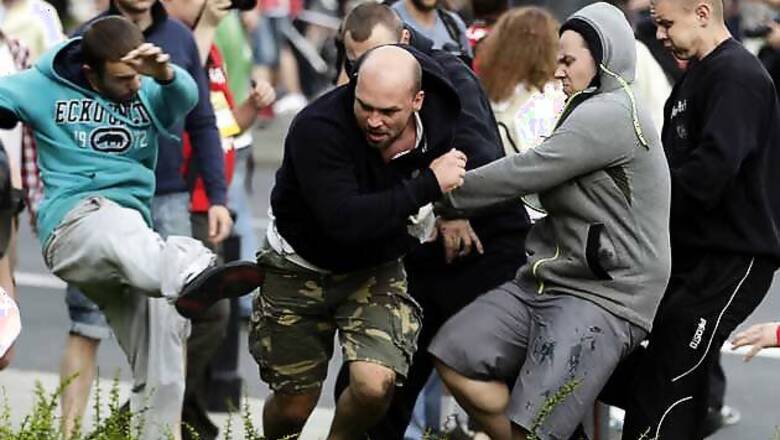
views
Warsaw (Poland): Polish authorities apologised on Wednesday for the violence that broke out around a soccer match with Russia and pledged severe penalties for hooligans detained after bloody clashes near the stadium and at a fan zone.
Police, who feared trouble at the Euro 2012 game due to uneasy relations between the two countries, detained 184 people, 156 of them Poles, 25 Russians, and three other foreign fans.
The trouble flared after a march by thousands of Russian supporters came under attack by masked hooligans.
The violence is an embarrassment for the Polish co-hosts who had until then presided over a mostly peaceful tournament, despite worries about soccer hooliganism across Eastern Europe.
Police authorities, who had 6,400 officers on the streets and needed reinforcements from other cities, defended their response and said they had not been too slow to act.
The match ended in a 1-1 draw.
Very sorry
"We are very sorry that our guests were attacked by hooligans and they lost their feeling of security," said Jacek Kozlowski, Governor of Masuria province.
"But police managed to reduce the threat."
During the most violent skirmishes near the stadium after Russian fans had crossed the Vistula river, riot police fired tear gas and rubber bullets at groups of young men who threw bottles and flares and later punched and kicked some of the Russian marchers.
Some of the Russians fought back and Poles and Russians also clashed with Police, injuring 10 officers.
"When it comes to our hooligans, I hope the prosecutors and especially the courts will be strict," Interior Minister Jacek Cichocki told a news conference.
Cichocki added that the detained Russians would face accelerated court procedure and would likely be expelled from Poland and banned from Europe's border free Schengen area for five years.
Trouble feared
Authorities had been braced for a confrontation at the Group A game between the neighbouring countries, whose relations have been burdened by centuries of conflict and the Soviet domination of Poland for more than four decades after World War Two.
Black-clad individuals mixed with football fans in the city, and police said they had communicated through social media.
"We had surveillance and intelligence that such individuals would come and we had extra identity checks... but this is not a police state and you cannot arrest someone on their looks," said Warsaw police spokesman Maciej Karczynski.
"Police can only respond when an individual starts to act in a threatening way."
Interior Minister Cichocki praised the police and said he thought the number on duty was appropriate.
Scores of riot police entered the Warsaw stadium after the match to survey Russian fans, who were kept inside for an extra 20 minutes.
"Police entered the stadium which is almost unprecedented, but we had intelligence that there could be incidents in the stadium," said Karczynski.
The next match in Warsaw is between Russia and Greece on Saturday.

















Comments
0 comment